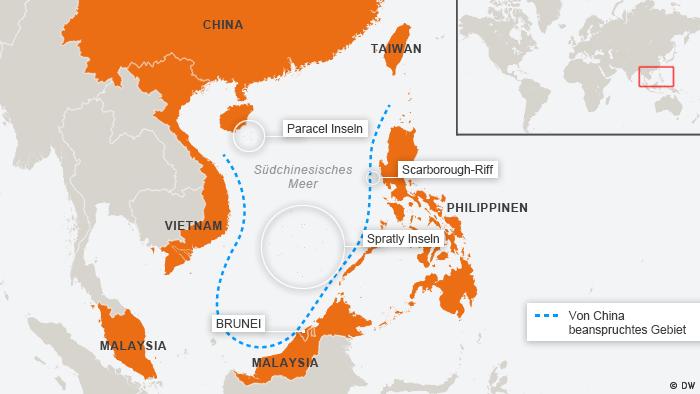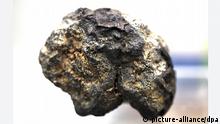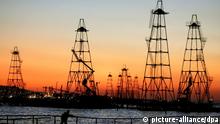
就围绕南中国海可能的丰富资源的主权之争,维也纳出版的保守主义报纸《新闻报》周一(8月6日)发表题为“北京在太阳下的位子”的评论,强调相关争议令人回想起当年的帝国主义强权游戏.
现代强权“应该承认,这样的类比现在尚不完全合适。但是,数星期以来、数月以来围绕南中国海所发生的事情却已慢慢地让人回想起20世纪早期的帝国主义强权游戏。
“正如帝国总理冯·比洛(Bernhard von Bülow)所描述的那样,德意志帝国当时在寻找“太阳下的地盘”,并为此同英国和法国等殖民列强相互争夺。相关冲突结局如何,人们自可以从历史书籍中读 到,—不是令人愉快的阅读。一百年后,中国和美国继承了德国和英国当年的衣钵,只不过,游戏场所不是非洲,而是东南亚。”

“原料市场正经历一场专家所称的超级周期,即长期而剧烈的价格上涨周期。这导致众多国家原料政策改变。鉴于原料供应部分出现戏剧化紧缺,原料保护主义正大行其道,···
“主要角色正是中国,这可以有两个原因。一个是不言自明的:中国人口13亿,经济快速增长,向基础设施巨额投资。第二个原因是政治上的:与西方相比较,在 中国的国家资本主义里,政治和经济融合程度更高。中国的国有企业常常通过使用巨额资金、避免事半功倍的开发援助而获得原料渠道。中方运作的中心目标是,使 本国经济摆脱波动不定的世界市场价格的制约,并在一旦出现原料进一步匮乏时处于不败之地。”
告别公开市场
《柏林日报》认定,国际市场上,原料保护主义来势汹汹的一大重要原因就是中国改变了游戏规则—
“中国则以不向世界市场供应原料为手段,改变了游戏规则。在稀土生产方面,中国拥有全球垄断地位。···

《柏林日报》的文章最后写道:
“这样的行为方式类似于中国:直接获得资源可以让本国经济更不受世界市场制约。但是,在这样做的时候又要尽量不受他人监督。而一旦事关透明,在原料的竞争中,中国显然又是榜样。”
摘编:凝炼
责编:洪沙
美國國務院上週五針對南海議題發表書面聲明,其中提到中國在南海設立三沙市並成立新的警備區,違反化解歧見的合作外交努力,並可能進一步升高區域緊張情勢。
Nationalism online
Backfired
Some Chinese question the party line on patriotism and dissent
May 19th 2012 | BEIJING | from the print edition


Few in China doubt their government’s claim to Scarborough Shoal (or Huangyan island as Chinese call it) or indeed any of the islands within the so-called “nine-dashed line” (see map). Chinese belligerence over the South China Sea has backfired in recent years by pushing neighbours closer to America, but the issue has shown little sign of igniting a broader outbreak of jingoistic sentiment back home. Only a handful of Chinese gathered outside the Philippine embassy in Beijing. (Some 300 Filipinos protested in Manila.)
China’s neighbours are ever fretful about the possibility that popular nationalism in China might goad the country’s leaders into muscle-flexing abroad. Recently they have had particular cause to worry. The party is under enormous stress following the suspension of a Politburo member, Bo Xilai, last month and as it prepares for big changes in the leadership late this year. Signs of a slowing economy (see article) are adding to the party’s woes. Chinese leaders might be tempted to encourage some flag-waving and foreigner-bashing as a way of distracting the public from domestic problems. But recently unusual signs of resistance to such tactics have emerged. The troubles the party would like to disguise may well be inspiring some Chinese to be more critical.
This has been most obvious in public responses to the flight last month of a blind activist, Chen Guangcheng, to the American embassy in Beijing and his subsequent move to a Beijing hospital for treatment. Mr Chen is the first dissident since 1989 to have gained American diplomatic shelter in China. Yet even online nationalists, ever ready to accuse the West of interfering in China’s affairs, have been subdued. (Mr Chen still awaits a passport that would enable him to leave for study in America.)
On May 4th several Beijing newspapers published editorials attacking Mr Chen and American diplomats, calling Mr Chen a “pawn” being used by American politicians to discredit China. Many microbloggers in China responded by attacking the newspapers, not Mr Chen. Late that night one of the papers, Beijing News, published what appeared to be an apology on its microblog account. It showed a photograph of a bedraggled clown smoking a cigarette, with the words: “in the deep still of the night, we take off our mask of insincerity and say to our real selves, we are sorry”. Censors later removed it, after thousands posted messages of support for the newspaper’s apparent change of heart. A Chinese news website, Caixin, called one of the editorials “inappropriate” and a “laughing stock”.
Attempts by state-run newspapers to discredit America’s ambassador to China, Gary Locke, for helping Mr Chen have also aroused little sympathy. On May 14th Beijing Daily tried to taunt Mr Locke by calling on him to reveal his assets. Liu Yadong, a senior editor of another official newspaper, Science and Technology Daily, pointed out on his microblog that public officials in America disclose their assets as a matter of course (Mr Locke’s are readily available). There have long been calls for similar disclosure in China, where official corruption is endemic, and the debate gave broader publicity to those calls. Deluged with criticism, Beijing Daily removed its posting.
Popular nationalism remains a powerful force, but the authorities are wary of giving it free rein, lest it turn against the party itself. Last month they ordered a nationalist website founded during the upsurge of 2008 (m4.cn, formerly Anti-CNN.com) to close its bulletin board. They did not want it stirring trouble again.
商人總是不知道主權與利益之分
菲律賓商界:與中國對抗代價慘重Philippine business warns on China stand-off英國《金融時報》 羅爾•蘭丁金馬尼拉, 鄺彥暉北京報導
Philippine businesses are calling for a quick resolution to the month-long stand-off with Chinese ships in the South China Sea, warning that a prolonged political impasse could hurt tourism and cost thousands of export-related jobs.
菲律賓商界呼籲盡快解決菲中艦船在南中國海已延續一個月的對峙,警告持續政治僵局可能損害菲律賓旅遊業,並使該國失去成千上萬出口相關的就業崗位。The warning followed signs that the confrontation was beginning to have an economic impact, with Chinese tour groups cancelling trips to the Philippines and shipments of Philippine bananas blocked from entering China for food safety reasons.
菲律賓商界發出這一警告之前,有跡象顯示,這場對抗正開始產生經濟影響,中國旅行社取消前往菲律賓的旅遊團,中國還以食品安全為由,阻止菲律賓發運的香蕉進入中國。“We have more to lose than them”, Sergio Ortiz Luis, head of the Philippine Confederation of Exporters, told local television.
“我們的潛在損失超過他們,”菲律賓出口商協會(Philippine Confederation of Exporters)會長塞爾吉奧•奧爾蒂斯•路易斯(Sergio Ortiz Luis)對當地電視台表示。China is the Philippines' third-biggest trading partner and its fastest-growing source of foreign tourists.
中國是菲律賓的第三大貿易夥伴,也是菲律賓增長最快的旅遊客源國。The warnings are increasing pressure on Benigno “Noynoy” Aquino, Philippine president, to find a temporary solution to the dispute, which began last month when a Philippine navy ship attempted to detain eight Chinese fishing vessels near Scarborough Shoal, about 120 nautical miles west of the Philippines' main island of Luzon.
這些警告給菲律賓總統貝尼尼奧•阿基諾三世(Benigno Noynoy Aquino)帶來更大壓力,要求他找到這場爭端的臨時解決方案。爭端始於上個月,當時菲律賓海軍一艘軍艦企圖在菲律賓主島呂宋島以西大約120海里處的斯卡伯勒淺灘(Scarborough Shoal,中國稱黃岩島——譯者註)附近海域扣留八艘中國漁船。Scarborough Shoal, which the Chinese call Huangyan, is claimed by both countries, and is just one of many territorial disputes across the South China Sea. The foreign ministries of the two governments have been trying to calm tensions but the incident has sparked strong nationalist rhetoric in both China and the Philippines.
中國和菲律賓都宣稱擁有斯卡伯勒淺灘的主權,而這只是南海眾多領土糾紛之一。兩國的外交部一直在試圖平息緊張局勢,但這一事件在兩國都已引發強烈的民族主義言論。“On both sides there are people hoping the incident will escalate, and others who want to contain it. It is very hard to tell which side has the upper hand,” said Jin Canrong, an international relations expert at Renmin University.
“雙方都有人希望事件升級,也都有人希望控制局面。很難判斷哪一方佔了上風。”中國人民大學的國際關係專家金燦榮表示。China and the Philippines resumed talks late last week, and Mr Aquino said on Tuesday that negotiations were yielding positive results. “It's too early to say the situation has cleared up but we're getting there,” he told journalists after a speech in the southern Philippines.
上週晚些時候,中國與菲律賓恢復談判。阿基諾週二表示,談判正在產生積極的結果。 “要說局面已得到解決,現在還為時過早,但我們正在這個方向上取得進展,”他在菲律賓南方發表講話後對記者們表示。That would be much welcomed by Philippines businessmen. The Pilipino Banana Growers and Exporters Association warned that up to 200,000 banana farmers and ancillary workers could lose their livelihood if China, the industry's second biggest export market, stops importing bananas from the Philippines.
那將受到菲律賓商界的熱烈歡迎。菲律賓香蕉種植及出口企業協會(Pilipino Banana Growers and Exporters Association)警告稱,如果該行業的第二大出口市場中國停止進口菲律賓香蕉,可能會有多達20萬蕉農和配套服務工人失去生計。China Southern Airlines has said it plans to cut flights between Guangzhou and Manila in May and June due to a large number of cancellations by Chinese tour groups to the Philippines, after Beijing issued a travel advisory following small anti-Chinese protests in Manila last week.
中國南方航空公司(China Southern Airlines)已表示,計劃減少5、6月份廣州與馬尼拉之間的航班,原因是中國旅行社取消了大量前往菲律賓的旅遊團。上週馬尼拉爆發小規模的反華抗議後,中國官方發布了一項旅遊安全提示。One opportunity for a resolution would come on Wednesday, when China begins its annual fishing ban in parts of the South China Sea including the waters currently under dispute. The Philippines said it did not recognise China's fishing ban but would impose its own ban to slow down the rapid depletion of fish stocks in the area.
週三將迎來解決爭端的一個機會,中國從這一天開始在南海部分海域(包括這一爭端涉及的海域)實行年度休漁期。菲律賓表示,該國不承認中國的休漁規定,但將出台自己的休漁規定,以減緩當地漁業資源的快速枯竭。A fishing ban would in theory lower tensions by keeping fishing boats from both sides away from the disputed area, but could also have the opposite effect as official vessels from both countries are likely to patrol the waters to enforce the ban.
理論上,休漁將降低緊張程度,因為雙方的漁船都不得進入有爭議的海域,但此舉也可能產生相反的效果,因為兩國官方的海監船很可能會在相關海域實施巡邏,以執行休漁規定。“If no path to a solution can be found during the fishing ban, the next opportunity could be even more distant,” said Zhang Mingliang, a professor at the Institute of Southeast Asian Studies at Jinan University.
“如果在休漁期間找不到通向解決方案的路徑,那麼下一個機會可能更加遙遠,”暨南大學東南亞研究所教授張明亮表示。Additional reporting by Gwen Chen and Zhao Tianqi in Beijing
陳曉敏和趙添琦北京補充報導
譯者/何黎
中國敦促菲律賓保護在菲中國公民安全
 在菲律賓計劃於週五舉行反華抗議活動之前﹐
在菲律賓計劃於週五舉行反華抗議活動之前﹐中國要求菲律賓保護好中國公民的人生和財產安全﹐
同時重申了中國對黃岩島的主權。中國多家旅行社暫停赴菲律賓旅遊
菲報:菲律賓參院促政府“準備戰爭”
中國針對南中國海僵局強硬表態
Taiwan Central Bank Governor: Chiang Mai Initiative Should Be Expanded Further
TAIPEI (Dow Jones)--Taiwan's central bank governor, Perng Fai-nan, Friday called for further expansion of a fund that Southeast and East Asian nations can access in the event of a liquidity crisis.
| 彭淮南:亞銀年會 成果豐碩 |
總部設在馬尼拉的亞洲開發銀行,2日起至5日召開第45屆年會,彭淮南率財政部、國際合作發展基金會及外交部官員,就亞洲經濟體如何轉型因應全球經濟危機的議題,與來自全球逾4000名金融官員與專家共同商討對策。
中華民國代表團由彭淮南率領2日中午抵達馬尼拉,下午即由駐菲代表王樂生陪同,前往會場菲律賓國際會議中心會見亞銀總裁黑田東彥,雙方進行將近1小時的閉門會晤。
彭淮南表示,他與黑田東彥討論了中華民國跟亞銀的合作關係,而國合會也願意與亞銀加強合作,雙方的意見交換「非常有建設性」。
此外,彭淮南也在會中建議合併東協+3總體經濟監控辦公室(AMRO)和清邁倡議多邊換匯協定(CMIM)機制,以達到亞洲貨幣基金(AMF)的功能。
與會者對中華民國代表團的建議反應正面,彭淮南說,今年參加會議的成果相當豐碩。
至於年會期間是否與中國大陸官員討論兩岸貨幣清算機制,彭淮南則是三緘其口。
另一方面,黑田東彥在閉幕聲明中說,今年的年會在對未來充滿信心及樂觀的氛圍下落幕。
他表示,亞洲轉型在急劇改變的世界中扮演重要角色,亞洲擁有前所未有的良機,可以為民眾提供更好的生活,並持續為全球成長做出貢獻。
黑田東彥也指出,亞洲仍然面臨許多尚待解決的挑戰,但地區的基礎強勁,有能力朝包容性、綠色及知識主導的成長方向前進。
亞洲開發銀行成立於1966年,總部設在馬尼拉。明年將由印度擔任主席,年會將於印度德里(Delhi)舉行。2012/5/5
沒有留言:
張貼留言